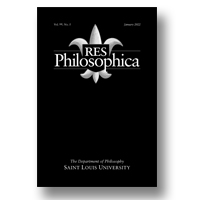|
|
|
21.
|
Res Philosophica:
Volume >
100 >
Issue: 1
Alexis Elder
Robots, Rebukes, and Relationships:
Confucian Ethics and the Study of Human-Robot Interactions
abstract |
view |
rights & permissions
| cited by
The status and functioning of shame is contested in moral psychology. In much of anglophone philosophy and psychology, it is presumed to be largely destructive, while in Confucian philosophy and many East Asian communities, it is positively associated with moral development. Recent work in human-robot interaction offers a unique opportunity to investigate how shame functions while controlling for confounding variables of interpersonal interaction. One research program suggests a Confucian strategy for using robots to rebuke participants, but results from experiments with educational technologies imply a different and potentially opposing account of shame’s role in personal development. By digging deeper into the details of Confucian theorizing about shame, I identify a unifying explanation for these apparently conflicting results. I conclude by offering suggestions for future empirical research in human-robot interactions to further investigate shame’s role in moral development.
|
|
|
|
|
|
|
22.
|
Res Philosophica:
Volume >
100 >
Issue: 1
Bryce Huebner
A Neuro-Yogacara Manifesto
abstract |
view |
rights & permissions
| cited by
In this article, I defend a neuro-Yogacara framework that is based on an understanding of allostatic regulation, and organized around the following four philosophical claims: 1) experience is shaped, in deep and pervasive ways, by a person’s history and their ecological and social context; 2) each moment of experience occurs amid an ongoing flow of conscious activity, which reflects the attempt to integrate diverse sensory and cognitive experiences into a subjective awareness of a world; 3) every claim about a specific feature of experience is an abstraction, which only makes sense within the context of a complex and multidimensional experience of a world; and 4) the experience of being a self, in a world, is malleable.
|
|
|
|
|
|
|
23.
|
Res Philosophica:
Volume >
100 >
Issue: 1
Ryan Nichols, Nicholaos Jones
Holistic Cognitive Style, Chinese Culture, and the Sinification of Buddhism
abstract |
view |
rights & permissions
| cited by
According to many experiments in cross-cultural psychology, East Asians exhibit holistic cognitive style typified by use of resemblance heuristics, field dependence, external sources of causation, intuitive forms of reasoning, and interdependent forms of social thinking. Holistic cognitive style contrasts with analytic cognitive style, which is common to Westerners. Section 1 presents information on the background of Buddhism’s entry into and treatment by China. Section 2 discusses experimental evidence for the representation of holistic cognitive style in contemporary East Asians. Section 3 presents preliminary evidence for the interaction between holistic cognitive style and the history of ideas in China at large. Section 4 analyzes two discussions of the same philosophical problem conducted by Chinese Buddhist philosopher Fazang and Indian Vedic philosopher Shankara. It is provisionally argued that the interpretive strategies displayed by Fazang interact with several components of holistic cognitive style, in contrast with Shankara. Implications are discussed.
|
|
|
|
|
|
|
24.
|
Res Philosophica:
Volume >
100 >
Issue: 1
Julianne Nicole Chung
"See You in Your Next Life":
Creativity, the Zhuangzi, and Grief
abstract |
view |
rights & permissions
| cited by
Drawing from cross-cultural work on creativity undertaken within philosophical psychology, as well as contemporary commentaries on the philosophy of the Zhuangzi, this article motivates a conception of creativity that emphasizes spontaneity and adaptivity—rather than novelty or originality—engendered by embracing you 遊 (“wandering”). It argues that this approach to creativity can enable us to understand certain forms of religious experiences, especially those related to grief and bereavement, as creative in a sense that is compatible with both: i) views that emphasize the capacity of religious experiences to connect us with something supernatural, immaterial, or non-physical and, ii) views that emphasize the capacity of religious experiences to connect us with something natural, material, or physical. Additionally, it elaborates how these reflections might pave the way for further cross-cultural inquiries—empirical and otherwise—into the nature and value of religious experience
|
|
|
|
